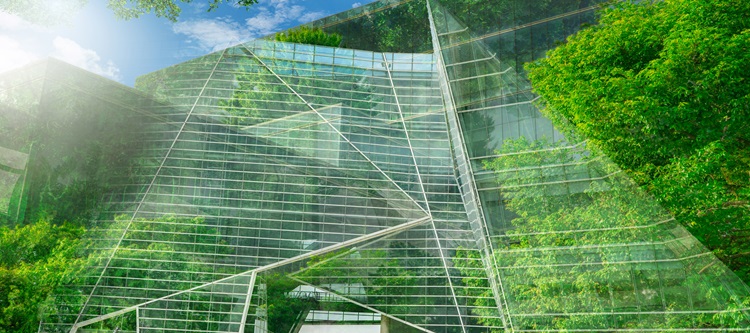In this article:
In recent years, the construction industry in Massachusetts has been increasingly focused on embracing sustainable practices and minimizing its environmental impact. An integral part of this shift is the use of eco-friendly building materials and sustainable landscaping solutions by homeowners. By opting for sustainable alternatives, construction projects can significantly reduce their carbon footprint and contribute to a greener future. In this blog post, we will explore five eco-friendly building materials currently used in Massachusetts construction projects. We’ll cover why these materials are more sustainable than more traditional alternatives and shed light on their sourcing methods.
1. Recycled Steel.
Recycled steel is a versatile and eco-friendly material that finds extensive use in construction projects. It is obtained from post-consumer and post-industrial sources, such as automobiles, appliances, and demolished structures. Here’s why recycled steel is a sustainable choice:
- Reduced Energy Consumption: Producing recycled steel consumes significantly less energy compared to virgin steel production. This reduction in energy consumption translates into reduced greenhouse gas emissions and a smaller carbon footprint.
- Conservation of Resources: Using recycled steel helps conserve valuable natural resources, as it reduces the need for mining and extraction of iron ore. By repurposing existing steel, we can extend its lifecycle and reduce waste generation.
- Sourcing: Recycled steel is sourced through a process called metal recycling. Scrap metal is collected, sorted, and then processed to remove impurities before it is transformed into usable steel for construction projects.
2. Bamboo.
Bamboo is a rapidly renewable and sustainable material that has gained popularity in the construction industry. It offers several environmental benefits over traditional wood materials:
- Rapid Growth: Bamboo is one of the fastest-growing plants on Earth. Its maturity cycle is significantly shorter than that of traditional hardwood trees, making it a highly renewable resource.
- Carbon Sequestration: Bamboo has a remarkable ability to absorb carbon dioxide from the atmosphere. As it grows, it sequesters more carbon than most other plants, making it an effective tool in mitigating climate change.
- Sourcing: Bamboo used in construction projects is typically sourced from responsibly managed bamboo forests. These forests are carefully maintained to ensure sustainable harvesting practices that do not harm the surrounding ecosystem.
3. Insulated Concrete Forms (ICFs).
Insulated Concrete Forms (ICFs) offer an eco-friendly alternative to conventional concrete construction. These forms consist of lightweight, interlocking panels made from recycled materials, such as expanded polystyrene (EPS) or recycled wood fiber. Here’s why ICFs are sustainable:
- Energy Efficiency: ICFs provide excellent insulation properties, reducing the need for additional heating or cooling. They help maintain stable indoor temperatures, resulting in energy savings and lower greenhouse gas emissions.
- Waste Reduction: The use of recycled materials in ICFs helps divert waste from landfills. By repurposing materials that would otherwise be discarded, ICFs contribute to a circular economy and reduce environmental impact.
- Sourcing: The materials used in ICFs, such as EPS or recycled wood fiber, are sourced from post-consumer and post-industrial waste streams. These materials are processed and transformed into the interlocking forms used in construction projects.
4. Recycled Glass.
Recycled glass is a sustainable material that can be used in various construction applications, including countertops, flooring, and tiles. It offers several environmental advantages:
- Resource Conservation: By using recycled glass, we can reduce the demand for raw materials required to produce new glass. This conservation of resources helps preserve natural habitats and ecosystems.
- Energy Savings: The production of recycled glass consumes less energy compared to the manufacturing of new glass. This reduction in energy consumption translates into lower carbon emissions and a smaller ecological footprint.
- Sourcing: Recycled glass is sourced from post-consumer glass waste, such as bottles and jars. This waste is collected, sorted by color, and processed into cullet, which is then melted and molded into new glass products for construction purposes.
5. Green Roofs.
Green roofs, also known as living roofs, are gaining popularity as a sustainable building practice. They involve covering rooftops with vegetation, providing numerous environmental benefits:
- Stormwater Management: Green roofs absorb rainwater, reducing stormwater runoff and alleviating strain on municipal drainage systems. This helps prevent flooding and minimizes water pollution.
- Thermal Insulation: The vegetation layer on green roofs acts as an additional layer of insulation, reducing heat transfer and lowering the energy required for heating and cooling buildings.
- Biodiversity and Urban Heat Island Effect: Green roofs provide habitat for plants, insects, and birds, promoting biodiversity in urban areas. They also mitigate the urban heat island effect by reducing the temperature of buildings and surrounding areas.
- Sourcing: Green roofs are created by integrating specific layers, including a waterproofing membrane, root barrier, drainage layer, growing medium, and vegetation. The growing medium typically consists of lightweight, organic materials such as compost, soil, and peat.
Conclusion.
The adoption of eco-friendly building materials is a crucial step toward achieving sustainable construction practices in Massachusetts. By incorporating materials like recycled steel, bamboo, insulated concrete forms (ICFs), recycled glass, and green roofs, construction projects can significantly reduce their environmental impact. These materials offer advantages such as reduced energy consumption, resource conservation, waste reduction, and carbon sequestration. Choosing sustainable alternatives and embracing innovative sourcing methods can play a vital role in building a greener and more sustainable future for all.








